LEND CURRICULUM DESCRIPTION
LEND (Leadership Education in Neurodevelopmental and related Disabilities) is an interdisciplinary leadership training program, funded by the Maternal and Child Health Bureau of the federal government at 52 sites.
The LEND Program at WIHD is a two-semester interdisciplinary leadership training program. LEND trainees include graduate students and post-doctoral fellows; self-advocates; and family members of children and adults with disabilities. Through participating in LEND, trainees develop knowledge and skills they will need to become leaders working with and on behalf of children with disabilities and other special health care needs, and their families, to improve health outcomes and decrease disparities.
The LEND Curriculum consists of three courses:
Overview of Neurodevelopmental Disabilities and Systems of Care (NDSC)
Course Director: Jenean Castillo, PhD
Course Description: NDSC Course Description 2023-2024
Seminar in Evidence-Based Methods (SEBM)
Course Director: Jenna Lequia, PhD
Course Description: SEBM Course Description 2023-2024
Interdisciplinary Leadership in Action (ILA)
Course Director: Jenean Castillo, PhD
Course Description: ILA Course Description 2023-2024
LEND PROGRAM HIGHLIGHTS
Introduction to the MCH Competencies
At the beginning of the LEND year, LEND introduces trainees to the MCHB Leadership Competencies through a series of interactive learning activities. These activities include a session during which trainees read each competency and share their comments, questions, reflections, connections, and summaries in relation to the competencies. In teams, they create a document called “MCH Competencies in Our Own Words”. Trainees review a sample of well-known leadership quotes, chose a quote that they personally connect with and explain how the quote relates to the MCH competencies, as well as to their hopes/dreams for their own leadership. To learn more about these activities and to see samples of the trainees’ work, go to https://mchb.hrsa.gov/training/leadership-00.asp
Introduction to Leadership
This series of interactive learning activities asks trainees to reflect on the concept of leadership. The learning activities targeted MCH Competency 2 (Self-Reflection and MCH Competency 3 (Ethics and Professionalism). Trainees self-reflect, read literature, engage in conversations with colleagues, watch a short video, and create a visual representation of themselves as leaders. To learn more about these activities and to see samples of the trainees’ work, go to http://www.aucd.org/itac/template/strategy.cfm?id=142.

Leadership Quotes

Student Work: Communication
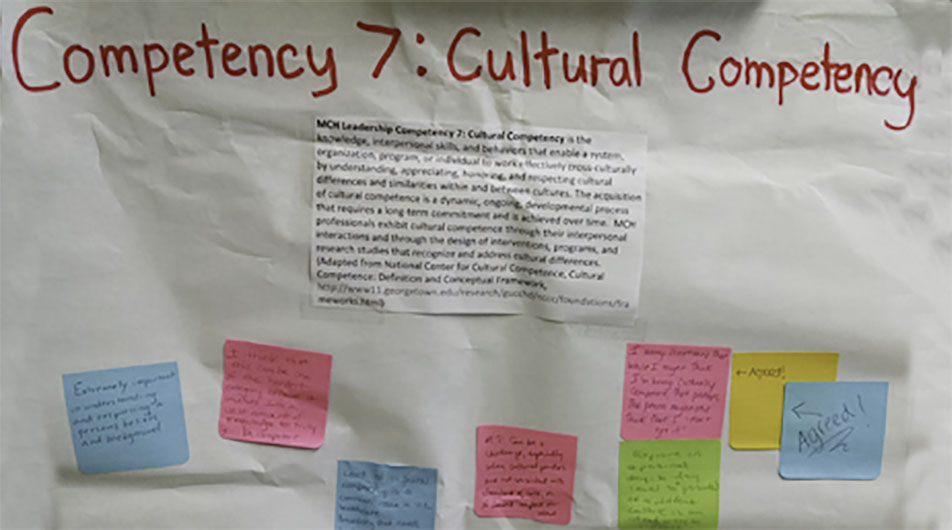
Student Work: Cultural Competency
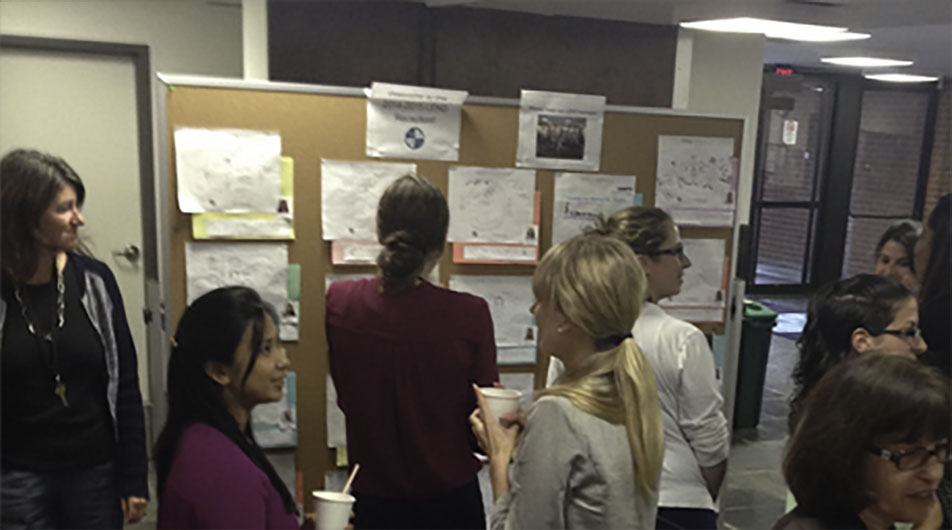
Leadership Competencies Activity
Values in Disabilities Book Discussion
In order to work effectively with and on behalf of children and adults with disabilities and family members, leaders must develop skills for and commitment to being attuned to the viewpoint, rights and perspectives of people with disabilities and their families. This assignment is one of several LEND experiences designed to help trainees accomplish this goal. Over the summer, trainees, faculty, and others read one of a selected group of books by or about people with disabilities, guided by the “Values in Disabilities Book Assignment”. During a LEND session at the beginning of the year, they discuss their assigned books. To see our book collection and learn more about this leadership activity, click here.
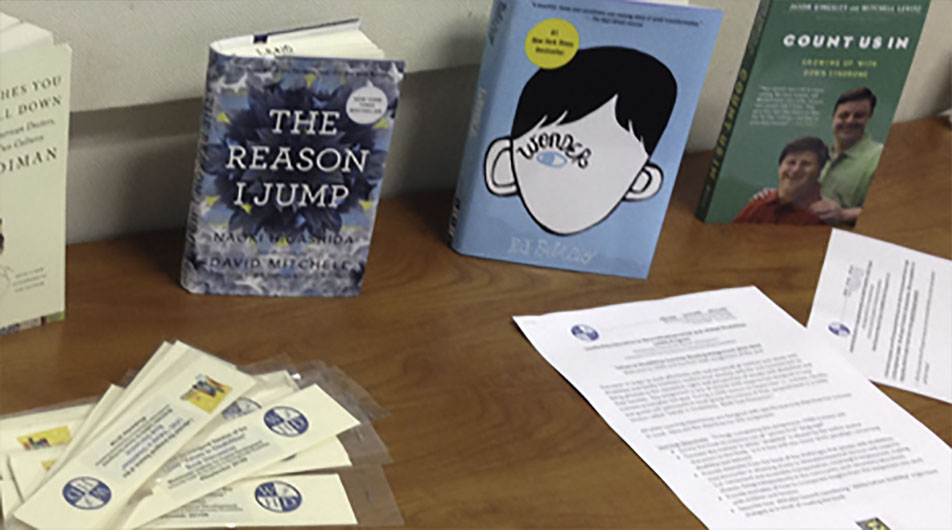
Values in Disabilities Book Collection
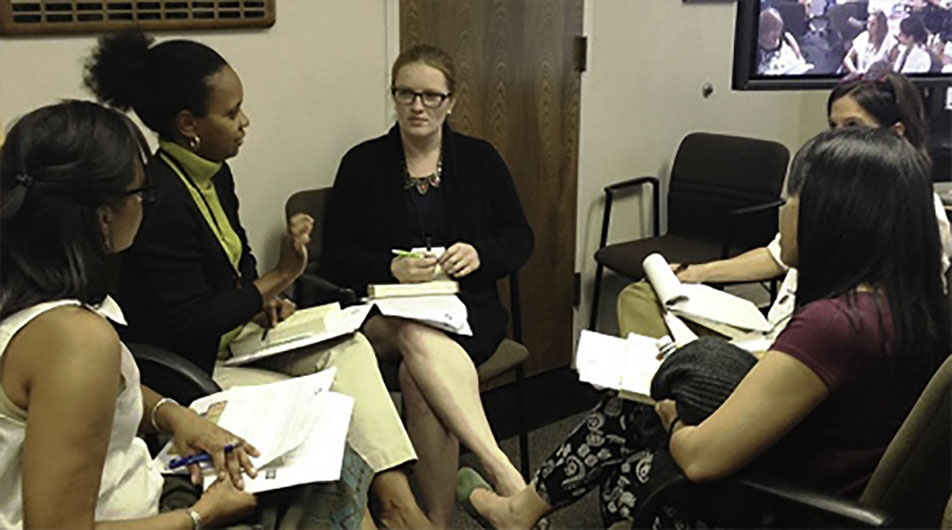
The Values In Disabilities Group Discussion
Life Course Theory and Social Determinants of Health
LEND Trainees at WIHD are learning how to apply knowledge of Life Course Theory and Social Determinants of Health to their work with children with disabilities and their families. One of the learning experiences is a session in which LEND trainees play the “Life Course Game” and debrief their experiences with the game. For additional information about using the Life Course Game as a teaching and learning tool, click here.
For additional strategies on incorporating Life Course Theory into the LEND curriculum, click here.
Additional resources concerning Life Course Theory can be found at the AUCD Life Course Perspective webpage (click here).

Life Course Board Game
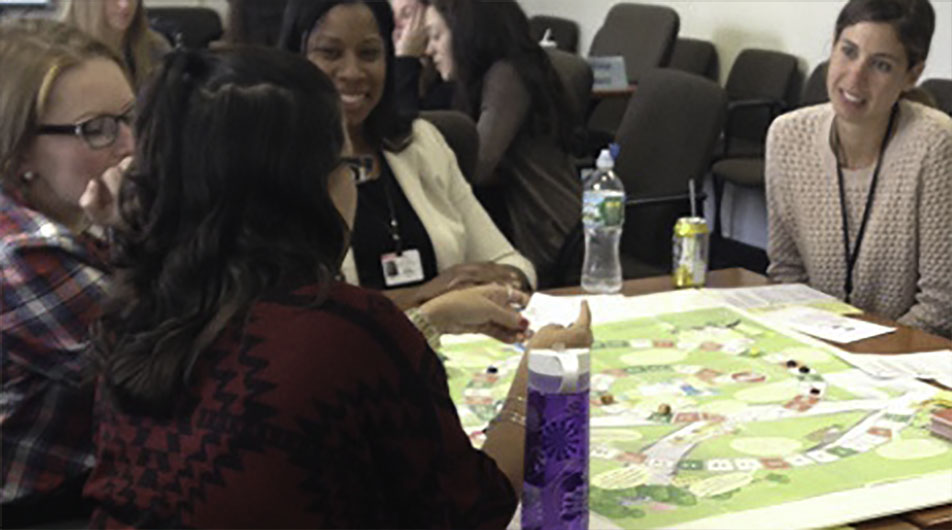
Trainees playing the Life Course Board Game
Disability Policy Seminar
LEND Trainees visits Capitol Hill as part of their experience at the Annual Disability Policy Seminar in Washington, DC.

LEND trainees at the Capitol Building
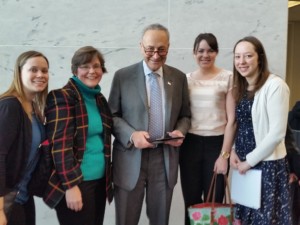
LEND trainees with Senator Charles Schumer

LEND trainees meeting with Representative Nita Lowey’s office
LEND Trainee Presentations to State Level Partners
LEND trainees make an impact by sharing the results of their research at an annual meeting with representatives from the Department of Health in Albany and other state-level partners.
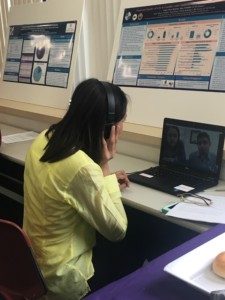
LEND Trainees participating from Puerto Rico
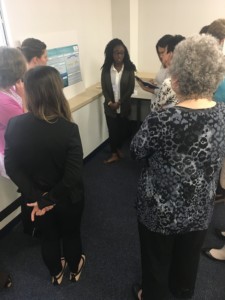
LEND trainee presenting to state-level partners
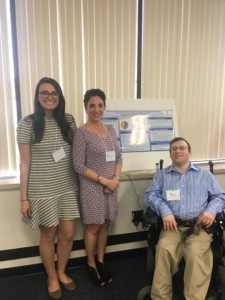
LEND trainee groups present their research posters in Albany
LEND Trainee Poster Session
At the poster session, LEND trainees and faculty share their research findings.

SEBM team presenting their research project

LEND trainees and faculty from the University of Puerto Rico presenting their research project

LEND Class of 2023
LEND Graduation
At LEND Graduation, trainees, their families, friends, colleagues and mentors are all invited to participate in a half day event. The event includes a poster session to present their research findings from the year, a graduation ceremony and a luncheon.
The LEND class of 2023 graduated 21 trainees on May 11, 2023. To view the photo gallery from this event, please click here.



LEND Research Posters
During the Seminar in Evidence-Based Methods (SEBM) course, students participate in a 68-hour, 2-semester course with a combination of didactic sessions, evidence-based interdisciplinary team projects, and oral and poster presentations. All teams engage a community partner at the local, state or national level as a project collaborator. The year culminates with poster and oral presentations in Albany with the New York State Department of Health and locally at WIHD. This presentation has been virtual for the past four years. Below are the posters created by the LEND class of 2023.
Assessing Cultural and Linguistic Competency
Daihana Frias; Margaret Gehm; Deborah Goglia, Linda Prieto; Rose Cineus
Faculty: Jenean Castillo, PhD
View Poster
Defining Features of Inclusive Communities: Perceptions of Parents of Children with Disabilities
Trainees: Kayla Campaña; Meg Cardi; Michelle Khan; Marissa Struck; Alejandra Oliva
Faculty: Jenna Lequia, Ph.D.
View Poster
Exploring the Perspectives of Biological Parents involved in the Child Welfare System during the COVID-19 Pandemic
Trainees: Nikoleta Alijaj; Stephanie Eberhart; Jessica Goh; Kate Meltzer; Leah Watson
Faculty: Trupti Rao, Psy.D., Beth Reiman, Ph.D.,LCSW
View Poster
Assessment of the Challenges Facing the Service Providers of Children with Suspected or Diagnosed Developmental Disabilities during the COVID-19 Pandemic
Trainees: Marianellie Cruz; Diego Lacy
Faculty: Carol Salas, PhD; María Reyes, PhD; & Ilia Torres, MS
View Poster
Understanding Challenges in the USVI to Accessing Appropriate Wheelchairs
Trainees: Ena Edward-Descartes
Faculty: Dr. Shelley Timmons
View Poster
Visual Sensory Behaviors in Autism: A Qualitative Analysis of Quotes from Autobiographies of Autistic Authors
Trainees: Allison Asher; Angelica Garcia; Nichole Hastings; Keri Kanetsky; Erika Pollack
Faculty: Patricia Towle, PhD and Nicole Turygin, PhD
View Poster

